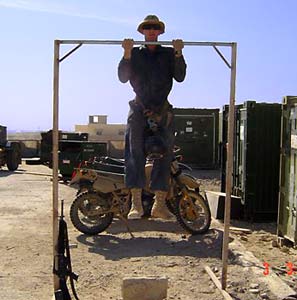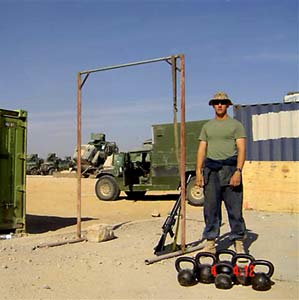How to Max the Marine Corps PFT
Sgt. Thomas C. Buhls, USMC
January 18, 2006 09:27 AM
For the purposes of this article, all training mentioned will be limited to a 12-month period from August 3rd, 2004 until August 10th, 2005. In the middle of June 2004 I was returning from two year overseas assignment and coming off of two deployments. I wasted little time getting to work with my training. My immediate training goal was to improve my forced march speed. I had been corresponding with Staff Sergeant Nathaniel J. Morrison, SRKC for a month or two prior. I asked him if he would help me improve my speed at forced marching. He agreed, and I began on August 3rd, 2004. While I wanted to improve my marching speed, I was also concerned about improving my Physical Fitness Test (PFT). To keep my body sharp for a PFT, I would practice Girevoy Sport (GS) three times a week. Then comes the Physical Training (PT) that I must participate in. Unit PT was usually pretty light on calisthenics, and very heavy on running. From August 3rd until September 22nd was a heavy training period. A typical training week looked like this:
Monday Morning? Ten to 20 minutes of calisthenics followed by a two to five mile run.
Afternoon? A five-mile forced march.
Tuesday Afternoon? 45 minutes GS.
Wednesday Morning? Ten to 15 minutes calisthenics followed by a two to five mile run.
Mid-day? 45 minutes GS.
Thursday Morning? 60 to 90 minutes of Marine Corps Martial Arts Program (MCMAP) sustainment training. A grappling session would be held at the end of the training session, with Marines taking turns grappling "bull in the ring" style until all Marines had gone at least once.
Afternoon? A five-mile forced march.
Friday Morning? Ten to 15 minutes of calisthenics followed by a five to eight mile run.
Afternoon? 45 minutes GS.
Saturday & Sunday? No training.
After all of this training, I found that I had not gotten any bigger as I had originally set out to do, but in fact I had gotten 12 pounds lighter over a two month period, and my body weight was bottoming out at 140lbs. The only good thing about it was that I had not gotten any weaker, and that my endurance for sprinting had improved greatly, as did my ability to march quickly under load. SSgt Morrison gave me a structured and progressive training program that I trained with. In the beginning of the training cycle I was humping 20% of my body weight five miles in 77 minutes, and at the time that I had to stop I was humping 35% of my body weight five miles in 67 minutes. The GS that I practiced three times a week was taken from the DVD,
The Tactical Athletes Pull-up System (TAPS) by Jeff Martone, SRKC. I used the TAPS training methods to improve my strength and size. My attempts at gaining size were useless at this point in time due to all of the running that I was doing. Averaging eight or nine miles a week was keeping me small and nothing in the world was going to change that.
October was a slow month. My battalion was deployed in support of units that were performing pre-deployment training. No serious training occurred in October. November was a new experiment and I found myself returning to pull-ups for training as a matter of necessity. Because I prefer to do pull-ups in a workout I browsed the Dragon Door training articles for ways that I can improve my pull-up PR. I found an article written by Simon Forsyth, RKC. It is titled, "How to reach the Spetnaz Standard." The Spetnaz standard being 18 dead hang pull-ups with 10kg attached to the body. My PR before starting this program was six reps. After only 13 training days spread over a one month period I had increased my weighted pull-ups by 50% (from six reps to nine reps) and achieved a 1RM of 60lbs. December was slow due to the holidays. January was the month that I played around with Mike Mahler's EDT program. I still did not gain any size. Do we see the continuing pattern yet? That pattern being that I was unable to gain size with what I was doing for training.
February, March, April, and May were slow months for training due to various mission requirements, and that our whole battalion returned to North Carolina in March. June was my next opportunity to start training with kettlebells again. I played around with squats for a week and a half, and then decided to test my 1RM on pull-ups and deadlifts. As it turned out, the little amount of GS that I had practiced stopped me from losing my previous gains on the deadlift, and even helped me to gain two deadlift PR's in one night, to include my first double body weight deadlift. My pull-up PR had also increased to 70lbs 1RM. How it is that it increased I can not even begin to explain! I can only say that GS helped me to make all these gains.
At this point in time I had begun to receive training from David Whitley, RKC. We worked on training to gain size, gain strength, and to maintain my three mile run time. A difficult combo. My run time did not slow down any, I did not get any bigger, but my pull-up strength had increased as did my PR for crunches in two minutes. I trained after a manner prescribed by David Whitley, using the Turkish Get-Up, the KB Clean& Press, pull-ups, the KB Front Squat, and the Two Arm KB swing.
At the start of August I had a PFT and I really had a chance to "stretch my legs" and see what I was capable of. On the tenth of August I performed the best PFT of my career. 20 pull-ups, 90 crunches (inside of two minutes), and a 21:26 three mile run. It is here that the story stops, as it was this very PFT that helped me to gain valuable promotion points. I never set out on a training evolution without a goal in mind. Whether that goal be to press more, pull more, lift more, or get bigger. It would not be fair for me to say that I have accomplished my goals, "all on my own." When I find a goal that I wish to train towards, I will frequently seek out help of those who are more knowledgeable than myself. That way I get, "more bang for my buck." Investing in a professional trainer is worth more than can be put in words, nor can I say enough positive praise for those who have helped me along the way. For my training needs as a Marine, I focus on the exercises and lifts that will most directly benefit me. I will not normally spend my time doing exercises such as a bench press as it is of no use to me. I focus on the exercises that improve what I get tested on, and what I am expected to perform. Pulling myself over obstacles, carrying a pack from point "A" to point "B" and back again, and lifting heavy objects. For my training needs, GS fits the bill.


-Thomas C. Buhls, Sergeant, United States Marine Corps
Back